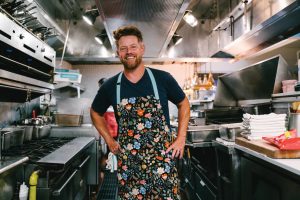King of the Kitchen
 Richard Blais has had quite the storybook career thus far. He learned the art of cooking working alongside some of the world’s most renowned chefs such as Thomas Keller and Daniel Boulud. He became a household name after appearing as a contestant (twice) and later a judge on the hit show Top Chef. What’s more, Blais has opened up restaurants on both coasts, become an author, hosted his own podcast series and transformed into a popular television personality. It would appear as if he lives a life in perpetual motion.
Richard Blais has had quite the storybook career thus far. He learned the art of cooking working alongside some of the world’s most renowned chefs such as Thomas Keller and Daniel Boulud. He became a household name after appearing as a contestant (twice) and later a judge on the hit show Top Chef. What’s more, Blais has opened up restaurants on both coasts, become an author, hosted his own podcast series and transformed into a popular television personality. It would appear as if he lives a life in perpetual motion.
But long before Blais became a restauranteur or a celebrity chef, his culinary journey began innocently enough at a place familiar to many—McDonald’s.
“I was a poissonier, which is ‘fish cook’ in French; it was a very prestigious position. But yeah, humble roots from McDonald’s to three-Michelin star restaurants and beyond. That’s the elevator pitch of my story for sure,” Blais says.
These days, Blais operates multiple restaurants including Four Flamingos here in Orlando at the Hyatt Regency Grand Cypress resort. Dubbed “a Richard Blais Florida Kitchen,” the restaurant opened a little more than a year ago and was inspired by “the Florida that I was excited about as a kid living in New York and jumping in the car and driving down 95,” he says.
Known for his whimsical nature and boundary-pushing creativity, Blais has built a following and is known for making food that showcases both fine ingredients and technique. And if the crowds of diners filling up the tables at Four Flamingos are any indication, the locals have welcomed him with open arms.
Outside of the kitchen, Blais stays busy with any number of his endeavors, including most recently returning to television on the cooking competition show Next Level Chef on Fox, which he co-hosts alongside fellow celeb chefs Gordon Ramsay and Nyesha Arrington.
If it sounds like a lot, it is. But Blais still found time to chat with us about the show, what drew him to Orlando and what he envisions for the future of the food industry.
You trained under some of the most revered chefs in the world. How did those experiences mold you into the chef you are today?
Certainly, in the early days, it was more of the camaraderie in the kitchen and the fraternity/sorority, family aspect. I always played sports, so really what drew me to the industry was the teamwork of it and the win or lose together sort of ethos that exists in team sports and in restaurant kitchens and good businesses alike.
Did those experiences help fuel your creativity in the kitchen?
Yeah, definitely. I ended up working in restaurants for some chefs who were at the top of their game and some who displayed tremendous creativity. And I definitely learned a lot from them.
And there was always an underlying artist quality with me, where I wanted to do things different and things that, for lack of a better word, were “cool” and “unique,” and also delicious and tasty. Certainly, I did get to work under some of the most creative chefs, for sure. But also a lot of chefs who concentrated and focused on the craft of cooking and the combination of those two things is what has led to the successes we’ve had.
Sounds like you are saying that it was important to master sound technique first and foremost.
Absolutely. There’s always people who hear my name and might think, “Hey, it’s the guy who messes around with liquid nitrogen.” And sometimes that upsets me because I also like to be known as someone who can roast a good chicken, or cook a piece of fish in a pan with butter, salt and pepper (laughs).
You were first introduced to the majority of the public when you when you appeared on Top Chef—a show you actually competed on twice, won once, and then became a judge. What was it like going from cooking for the judges to sitting alongside them?
It’s been a long journey, but I don’t know when the competitor-to-judge moment actually happened. But you get used to cooking, not only on Top Chef, but a lot of the other shows that I’ve competed on and or judged. It’s a natural transition. I liken it to the athlete who is now a pundit. You get better commentary, sometimes, from someone who has been in the situation. And at that time, when I started judging Top Chef and even the judging I am doing now, it really helps to have that perspective because there aren’t too many people judging on these shows that have been in the competitor’s shoes.
The second season of Next Level Chef recently premiered and so what can you tell us about the show and how do you think you would handle cooking under that kind of pressure?
I love it, I get to work with Gordon Ramsay and Nyesha Arrington. I’ve been blessed to work next to some of the absolute greats and icons of our industry, so just to spend time with Gordon and learn more about cooking, and also the craft of working on a television show is just fantastic.
The show itself is insane. How would I do on it? All the cooking shows are like running different races. Just because you are a marathoner, you may not be a great sprinter. You might not be great at the steeplechase or the hurdles, but maybe you can run a 100-yard dash really quick. This show is high-intensity sprinting and really, really difficult.
But I love it. I don’t think I’ve been more at home on a set. And kind of going back to the athlete example, this show gets the mentor on the floor with their team and you’re the coach running up and down the sidelines. To me, that’s the best part about this. You’re there with your team; you can’t do the work, they have to do the work, but you can help them get ready for the game and guide them a little bit. It’s so fun, I don’t really feel like you’re on a set, we’re in a game and that’s amazing.
I also wanted to ask you about Four Flamingos; what drew you to Orlando as a spot to open up this concept?
I was drawn to Orlando as a challenge to do a restaurant in that market. As I am growing as restauranteur and an entrée-preneur—which I’m intentionally mispronouncing—Orlando was just one of those spots where it’s like wow, let’s do it here. You have so many people, it’s such an international city; I don’t know if people really understand how many people come through Orlando.
I’ve always been a big fan, my wife is from Florida and I have family in Florida, so it was an easy OK because it’s a market we really, really love. Four Flamingos is flourishing right now a little more than year into itself, but its existence is also to me a great concept focusing on vintage Floridian flavors.
And we’re tapping into the Caribbean as well as Central and South America, and those are cuisines that I’ve always loved eating and enjoying and now to have the opportunity to learn more about them while we’re cooking that delicious food has been fantastic.
Do you have to approach things differently when you open up in Orlando in that you are catering to not only the locals, but also the influx of visitors who pass through the area?
Every restaurant in every neighborhood is different. Whether I am opening up a restaurant at a resort or an independent restaurant, they all have their own vibe. They are all my children. You know exactly how you want them to grow up, but some of it depends on their environment and where they are located and all those sort of things.
I don’t do anything different, I try to open up restaurants that would exist anywhere and do well. I think that approach helps me, to not think of the restaurant as its part of the hotel, or it’s a hotel restaurant. It’s not. It’s a restaurant that happens to be in a hotel. I think that is what’s been great about Four Flamingos. And the fact is that Orlando is a tough market to energize the locals because they have so many options. There are so many hotels and resorts, so the thing I am probably most proud of so far with Four Flamingos’ success, is the amount of locals that we have visiting the restaurant.
Do you like being identified as a celebrity chef or is that a moniker you shy away from?
I’ve become more used to it and I am OK with it the older I get. It comes with its own expectations and what people think of when they hear that term. But as long as people realize the word “chef” is part of it, I am quite OK with it.
When we open up a restaurant, you need to be the chef and when you are doing some other things, maybe you need to be a little bit more of a celebrity. As long as people respect me, and I’m working hard to maintain my sort of street cred as a chef, I am OK with the celebrity in front of it.
The food world has really exploded in the past 15-20 years, with more and more folks becoming at the very least casual gourmands. What does that increased level of interest mean for the future of the industry?
I think the more that people know about food and they get interested in it, that’s only good for our industry. It gets people more excited, educates them, it creates more products for farmers to sell and more business opportunities in so many different parts of our industry.
You know, it creates more competition, of course, and it creates higher expectations quite honestly. So for chefs and restaurant operators alike, rising to that level, that is what it’s all about.
With so much going on in your world at once, is there any time for you to relax and decompress?
I am very busy, but I just love what I do so I don’t ever really feel busy enough. Which is odd, and maybe my wife would say something else (laughs). But it’s almost like your daily intake of calories and nutrition, it’s just how I operate. I never get home from a day, even if it was rough or if we failed doing something, or even if something was crazy successful; I’m never coming home like, oh my God, that was work. I always feel like I’m doing something that I love and that is crucial.








